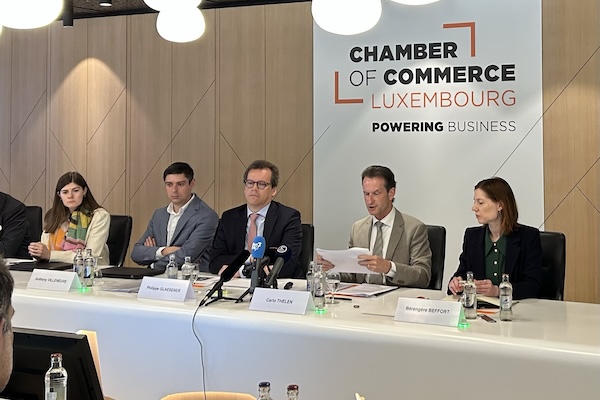 Jil Brimaire, Economist; Anthony Villeneuve, Senior Economist; Philippe Glaesener; Carlo Thelen; Bérengère Beffort, Head of Public Relations, Marketing & Communication; Luxembourg Chamber of Commerce;
Credit: Helen O'Mahony
Jil Brimaire, Economist; Anthony Villeneuve, Senior Economist; Philippe Glaesener; Carlo Thelen; Bérengère Beffort, Head of Public Relations, Marketing & Communication; Luxembourg Chamber of Commerce;
Credit: Helen O'Mahony
On Tuesday 29 April 2025, the Luxembourg Chamber of Commerce presented its Lux4Defence report at a press conference held at its premises in Luxembourg-Kirchberg.
Philippe Glaesener, elected member of the Luxembourg Chamber of Commerce and President of the Defence Working Group, and Carlo Thelen, Director General of the Luxembourg Chamber of Commerce, presented the report.
A working group, initiated in September 2024 by the Chamber of Commerce and chaired by Philippe Glaesener, developed the Lux4Defence report. It included representatives of a number of Luxembourg companies from industrial, financial and innovation sectors, among others, and incorporates ten recommendations to develop a strengthened industrial and technological defence base in Luxembourg. These recommendations were presented to Luxembourg’s government including Prime Minister Luc Frieden at the end of March 2025.
The presentation outlined that Luxembourg will increase its defence spending to €1.46 billion by 2030, up from €190 million in 2014, in order to meet any security challenges. The report states that, along with increased military spending, it is also necessary to develop a national industrial and technological defence system while generating maximum economic returns.
According to Carlo Thelen: “Every euro invested in the country's defence and security must also be a lever for growth, competitiveness and innovation for Luxembourg."
The ten recommendations are as follows:
- develop a defence industrial and technological base around the country’s niche specialist areas, e.g. equipment for soldiers, transport and logistics telecommunications and the sovereign cloud;
- create a National Defence Task Force to coordinate defence policies, relations between NATO and the European Union and maximise economic returns;
- create a physical Defence Hub that will offer, among others, a secure environment to encourage defence research and innovation, pool costs and encourage collaboration between the various sectors. This would also incorporate the creation of the Association Nationale des Entreprises de la Défense (ANED - National Association of Defence Companies) which would work with the companies and liaise with the government;
- improve the transition from research to development in the defence sector. The report outlined how Luxembourg had a strong research history but could improve on the development of projects. This could be achieved with the development of a defence research and innovation fund, among other initiatives;
- create a national testing and validation infrastructure in real life conditions. The report proposes the creation of a national test centre to enable scientific, technical and operational experiments incorporating high security standards;
- create a marketplace, listing the products and services offered by those engaged with defence. This digital platform would list the products and services of Luxembourg companies active in defence. According to Philippe Glaesener: “This will be our strategic commercial showcase”;
- develop a national strategy to regulate offsets, i.e. the industrial counterparts associated with military orders, to ensure that Luxembourg would benefit from every arms contract signed with foreign suppliers;
- involve the Luxembourg Army in the testing, prototyping and feedback of any industrial and technological defence project;
- Luxembourg should guide and anticipate the capability needs of NATO and the European Union. The report recommends that the country should strengthen its influence with bodies that determine and allocate capability requests;
- lift current legal restrictions on the development of a defence industry in order to enable the establishment or development of companies active in the defence sector.
ANED is expected to become a platform for exchange, representation and development for Luxembourg companies operating in this area. Philippe Glaesener said: "ANED will be the government's preferred partner in the deployment of its defence economic policy. Because companies and the government truly share a common interest." He added that if Luxembourg were to obtain a 60% return on its future military spending, approximately 2,000 direct jobs could be created in the country. Carlo Thelen added that "Lux4Defence is not just another report: it is an invitation to act now and a guide for implementing concrete measures, in a geopolitical context that demands it”.








